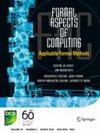Review on Theories of Programming: The Life and Works of Tony Hoare
IF 1.4
4区 计算机科学
Q3 COMPUTER SCIENCE, SOFTWARE ENGINEERING
引用次数: 0
Abstract
Sir Tony Hoare FRS is one of the leading computer scientists in the world. This book celebrates Hoare’s life and work as the 1980 winner of the ACM A. M. Turing Award [3], widely considered to be the nearest equivalent to the Nobel Prize in computer science. The Association for Computing Machinery (ACM) has decided to produce a series of books on Turing Award winners and this book forms part of that series. Tony Hoare’s contributions to computer science have been celebrated in previous books. The 1994 book A Classical Mind [4], referring to Hoare’s educational background in classics (“Literae Humaniores” at Oxford University), was produced as a collection of contributions by colleagues in celebration of Hoare’s 60th birthday. This was part of the Prentice Hall International Series in Computer Science, a series founded by Hoare and then edited by him for many years. In 1999, a Symposium was held in Oxford to celebrate Tony Hoare’s official “retirement” from the Oxford University Computing Laboratory and the Programming Research Group (PRG) there, although he continued to work for many further years at Microsoft Research in Cambridge. Several other Turing Award winners contributed to the Symposium and its associated proceedings Millennial Perspectives in Computer Science [2]. In 2006, the Computer History Museum, based in California, USA, celebrated Tony Hoare’s life with an oral history interview held in Cambridge [1], later summarized in the Communications of the ACM [5]. The book under review continues the celebration of Tony Hoare’s life and work. As in the previous books mentioned above, the volume mainly consists of contributions by Hoare’s colleagues, but also includes selected contributions by Hoare himself. The appendices provide additional relevant material. The volume is divided into seven parts. Part I provided introductory material including Hoare’s 1980 Turing Award lecture, originally published in the Communications of the ACM, together with an overview of Hoare’s ideas by the book’s editors. Part II covers program verification, a major aspect of Hoare’s contribution to computer science. Part III includes two chapters in Communicating Sequential Processes (CSP), a seminal approach to modelling concurrency formally using a process algebra. Part IV covers Hoare’s approach to teaching and his links with industry. Although Hoare has been a major contributor to theory underlying computer science, he has always recognized the importance of linking this with practical application. Part V presents程序设计理论述评:托尼·霍尔的生平与著作
托尼·霍尔爵士FRS是世界上领先的计算机科学家之一。这本书歌颂了霍尔作为1980年ACM A.M.图灵奖得主的生活和工作[3],图灵奖被广泛认为是最接近诺贝尔计算机科学奖的奖项。计算机协会(ACM)决定制作一系列关于图灵奖获奖者的书籍,这本书是该系列的一部分。托尼·霍尔对计算机科学的贡献在以前的书中得到了赞扬。1994年出版的《古典心灵》一书[4]提到了霍尔的古典教育背景(牛津大学的《人文文学》),是同事们为庆祝霍尔60岁生日而创作的一本作品集。这是Prentice Hall国际计算机科学系列的一部分,该系列由霍尔创建,然后由他编辑多年。1999年,牛津举行了一次研讨会,庆祝托尼·霍尔从牛津大学计算实验室和编程研究小组(PRG)正式“退休”,尽管他在剑桥的微软研究所继续工作了多年。其他几位图灵奖得主为研讨会及其相关论文集《计算机科学的千禧年展望》做出了贡献[2]。2006年,位于美国加利福尼亚州的计算机历史博物馆在剑桥举行了一次口述历史采访,以庆祝托尼·霍尔的一生[1],该采访后来在ACM通讯[5]中进行了总结。这本正在审查的书继续庆祝托尼·霍尔的生活和工作。与上述前几本书一样,该卷主要由霍尔同事的贡献组成,但也包括霍尔本人的精选贡献。附录提供了其他相关材料。这本书分为七个部分。第一部分提供了介绍性材料,包括霍尔1980年的图灵奖演讲,最初发表在ACM通讯上,以及该书编辑对霍尔思想的概述。第二部分介绍了程序验证,这是霍尔对计算机科学贡献的一个主要方面。第三部分包括通信顺序进程(CSP)的两章,这是一种使用进程代数形式化建模并发的开创性方法。第四部分介绍霍尔的教学方法以及他与工业界的联系。尽管霍尔是计算机科学理论的主要贡献者,但他始终认识到将其与实际应用联系起来的重要性。第五部分介绍
本文章由计算机程序翻译,如有差异,请以英文原文为准。
求助全文
约1分钟内获得全文
求助全文
来源期刊

Formal Aspects of Computing
工程技术-计算机:软件工程
CiteScore
3.30
自引率
0.00%
发文量
17
审稿时长
>12 weeks
期刊介绍:
This journal aims to publish contributions at the junction of theory and practice. The objective is to disseminate applicable research. Thus new theoretical contributions are welcome where they are motivated by potential application; applications of existing formalisms are of interest if they show something novel about the approach or application.
In particular, the scope of Formal Aspects of Computing includes:
well-founded notations for the description of systems;
verifiable design methods;
elucidation of fundamental computational concepts;
approaches to fault-tolerant design;
theorem-proving support;
state-exploration tools;
formal underpinning of widely used notations and methods;
formal approaches to requirements analysis.
 求助内容:
求助内容: 应助结果提醒方式:
应助结果提醒方式:


